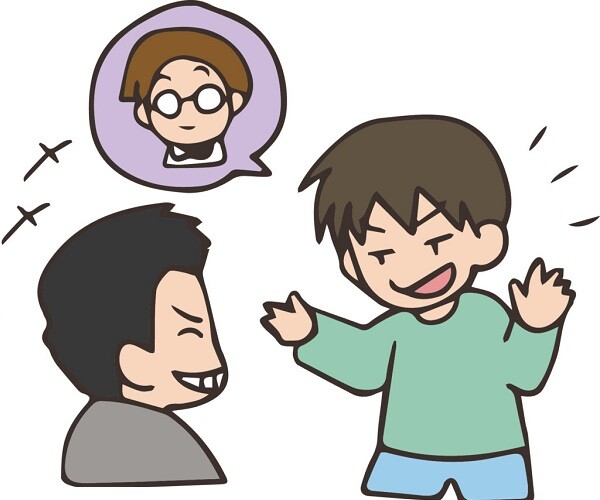The way parents discuss personal matters and gossip about others, including relatives, neighbors, or friends, in front of their children is an issue that warrants careful consideration.
Many parents may not realize the impact of these daily conversations, but in reality, such dialogues can profoundly influence their children’s psychological development and character formation.

Illustration.
Children tend to imitate adult behavior. When they observe their parents expressing negative attitudes, they are more likely to emulate and adopt similar behaviors. This leads to the development of bad habits and makes it challenging for children to establish positive relationships with their peers.
To prevent these negative impacts, parents should pay attention to their communication style and the topics they discuss. Instead of negative discussions, parents can share positive stories about kindness, helping others, and mutual support. Encourage children to show empathy and respect for others, understanding that everyone has strengths and weaknesses.
On this matter, psychologist Nguyen Ngoc Vui will provide a deeper analysis.
 Psychologist Nguyen Ngoc Vui.
Psychologist Nguyen Ngoc Vui.

How will children perceive their parents if they frequently discuss others’ personal matters negatively in front of them? And how will this affect their personality?
When parents make accusations or criticize others in front of their children, it can have several impacts. For younger children, they are more likely to believe that these judgments are accurate. For instance, statements like “Uncle Eight from next door is terrible”, “Grandma favors baby B”, or “Our neighbors are very inconsiderate” can influence children to adopt these negative beliefs as well.
For older children in their teens, they start to form their own perceptions and may become less trusting of adult opinions. If parents continue to engage in negative discussions about personal matters, teens may perceive their parents as being “gossipy”, “drama-seekers”, or lacking integrity. This can lead to a more critical view of their parents.
Clearly, both of these scenarios can negatively impact a child’s personality. Firstly, children tend to imitate and learn from their parents’ behaviors. Secondly, parents create an impression of an unsafe world, leading children to believe that their personal issues are also up for discussion and judgment.

If children observe their parents frequently criticizing others, might they develop similar behaviors when interacting with their peers and adults?
The answer is “Yes”. The younger the child, the stronger the tendency to imitate and emulate adult behaviors. Therefore, when children witness their parents complaining and criticizing others, they are likely to adopt similar patterns of behavior. This also extends to environments where adults use foul language, are rude, or exhibit violent behavior…
Consequently, children may become impatient, quick to anger, and struggle to establish positive relationships. They may also face challenges in managing their emotions, becoming either easily hurt or prone to conflict with others.

What topics are safe and appropriate to discuss in front of children without negatively influencing their perceptions?
This largely depends on the parents’ values and the standards they wish to uphold. For instance, if parents value being good neighbors, being dutiful children, or being responsible at work, their family discussions will naturally gravitate towards these positive themes.
Consider this example: “Mom visited Uncle Eight next door because someone in his family is unwell”, or “Mom feels sorry for a thrifty colleague at work, so she shared some of our family’s blessings with her”. Emphasizing positive values will undoubtedly have a beneficial impact on children.
However, many families today focus their conversations on self-expression and sharing personal criticisms of others. If parents indulge in constant competition, fault-finding, and judgment, children will inevitably absorb these negative values.
As children grow up with these unhealthy core beliefs, they may struggle to connect with themselves and those around them. This can lead to psychological issues such as loneliness, low self-esteem, and difficulties in establishing healthy relationships.

If parents realize that their frequent discussions about others may negatively impact their children, where should they start to change their attitude and behavior?
It’s important to recognize that discussing others is not inherently harmful and can even be positive if done constructively. The problem arises when parents engage in criticism, fault-finding, and judgmental behavior. Parents need to identify their mistakes and assess whether they can be corrected.
If change is not possible, parents should create separate spaces for such conversations and discuss them privately. Occasionally, parents may need to address certain issues with their children, but the key is to convey positive messages that foster empathy, respect, and a positive value system. By presenting different perspectives, children will learn to think critically and form their own balanced opinions.





































